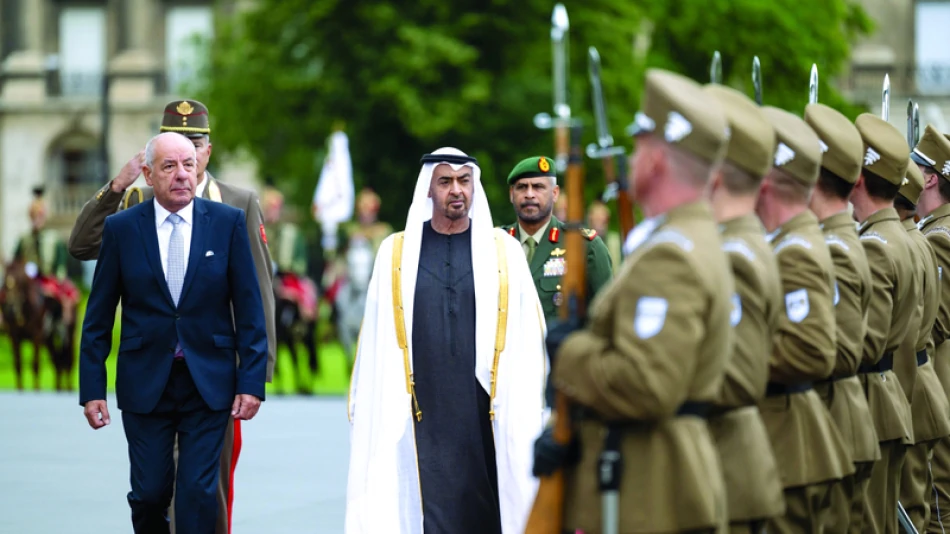
UAE and Hungary Celebrate 35 Years of Fruitful Partnership, Pledge Deeper Cooperation
UAE-Hungary Partnership Deepens as Diplomatic Ties Mark 35-Year Milestone
The United Arab Emirates is strengthening its strategic partnership with Hungary, with President Sheikh Mohamed bin Zayed Al Nahyan emphasizing expanded cooperation in development and cultural sectors during high-level talks in Budapest. The diplomatic engagement comes as both nations celebrate 35 years of formal relations, signaling deeper economic and cultural integration between the Gulf powerhouse and the Central European nation.
High-Level Diplomatic Engagement in Budapest
Sheikh Mohamed bin Zayed met with Hungarian President Tamás Sulyok and Prime Minister Viktor Orbán to explore enhanced bilateral cooperation, particularly in developmental and cultural spheres. The UAE leader took to social media platform X to highlight the discussions, emphasizing the mutual benefits for both nations and their peoples.
The timing of these talks is strategically significant, occurring during a period when both countries are seeking to diversify their international partnerships and economic dependencies.
Strategic Context: Why Hungary Matters to the UAE
Gateway to European Markets
Hungary's position within the European Union makes it an attractive partner for the UAE's continued expansion into European markets. As a member of both the EU and NATO, Hungary offers the Emirates access to European supply chains, regulatory frameworks, and consumer markets while maintaining relatively business-friendly policies compared to some Western European counterparts.
Economic Diversification Goals
This partnership aligns with the UAE's broader Vision 2071 strategy, which aims to make the country the world's best nation by its centennial. Hungary's strengths in manufacturing, automotive production, and technology sectors complement the UAE's focus on becoming a global hub for trade, tourism, and innovation.
Historical Precedent and Regional Patterns
The 35-year diplomatic relationship between the UAE and Hungary reflects a broader trend of Gulf states building stronger ties with Central and Eastern European nations. Similar to how the UAE has developed partnerships with countries like Serbia and Poland, these relationships often focus on pragmatic economic cooperation rather than ideological alignment.
Hungary's approach under Prime Minister Orbán has consistently emphasized economic pragmatism, making it an ideal partner for Gulf states seeking European engagement without the political complexities that sometimes arise with Western European partners.
Investment and Trade Implications
Potential Sectors for Cooperation
The emphasis on developmental cooperation suggests potential UAE investment in Hungary's infrastructure, renewable energy, and technology sectors. Hungary's automotive industry, which includes major manufacturers like Mercedes-Benz and BMW, could benefit from UAE sovereign wealth fund investments and expertise in supply chain management.
Cultural Exchange as Economic Driver
The focus on cultural cooperation likely extends beyond traditional cultural exchange to include education, tourism, and creative industries. The UAE's experience in building world-class cultural institutions like the Louvre Abu Dhabi could inform similar projects in Hungary, while Hungarian expertise in education and research could support the UAE's knowledge economy goals.
Broader Geopolitical Significance
This partnership reflects the UAE's sophisticated approach to international relations, building bridges across different regions and political systems. While maintaining strong ties with traditional Western allies, the Emirates continues to expand its influence in emerging markets and middle-power nations like Hungary.
For Hungary, deeper ties with the UAE provide economic opportunities and diversification away from over-reliance on traditional European partners, particularly important given ongoing EU tensions over various policy issues.
The 35-year milestone serves as a foundation for what both nations clearly envision as an expanded partnership, with potential implications for trade flows, investment patterns, and cultural exchange between the Gulf region and Central Europe.
Most Viewed News

 Sara Khaled
Sara Khaled






